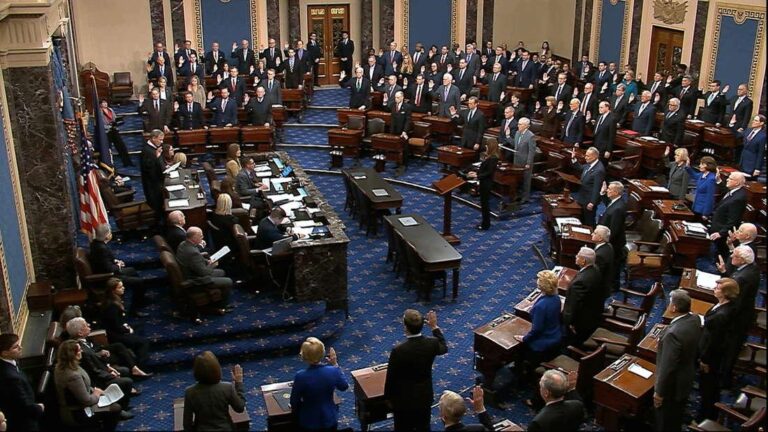Argentine Senate’s Rejection of Bill: A Turning Point in Political Dynamics
In a notable development within Argentina’s political sphere, the Senate has dismissed a proposal that sought to prevent former President Cristina Fernández de kirchner from assuming any public office in the future. This legislation sparked intense discussions among legislators and was viewed as a crucial indicator of the country’s political climate, which continues to be affected by significant economic challenges and social divisions. the Senate’s decision not only impacts Fernández de Kirchner’s ambitions but also highlights ongoing debates about governance and partisanship in Argentina.
Senate Vote: Insights into Political Strategies
The recent Senate vote marks an essential moment for Argentina, particularly concerning former Vice President Cristina Fernández de Kirchner.The rejection of the bill aimed at restricting her from public service illustrates the persistent tensions within Argentina’s political framework.Analysts suggest that this outcome reflects deeper power dynamics among various factions within the legislature, where alliances can shift rapidly. many senators perceived this failed legislation as an attempt to diminish her influence and exclude her from future electoral contests.
Supporters of Fernández de Kirchner view this decision as evidence of her enduring support base, which remains steadfast despite facing criticism and legal hurdles. Conversely, critics warn that such political maneuvering may exacerbate existing divisions within the country’s governance structure. key considerations include:
- Coalition Dynamics: The interplay between coalition partners and opposition groups considerably influenced voting outcomes.
- Public Opinion: Analyzing how this legislative rejection resonates with public views on Fernández de Kirchner’s legacy.
- Future Consequences: Evaluating what implications this decision holds for upcoming elections and potential new legislative efforts.
Examining Opposition Strategy: Future Legislative Implications
The recent Senate vote against barring former President Fernández de Kirchner from holding office carries significant implications for Argentina’s political landscape. This outcome reflects a strategic approach by opposition parties navigating through a complex governance environment shaped by her influence. Observers note that while supporting such controversial measures could demonstrate accountability, it also reveals fractures within opposition ranks and possibly misreads public sentiment regarding their stance on accountability measures against politicians.
This failure to pass legislation may inadvertently empower Fernández de Kirchner politically, potentially revitalizing her career at a time when she faces numerous challenges ahead. Furthermore, questions arise regarding the opposition’s capacity to collaborate effectively on future legislative initiatives given these dynamics:
- The Importance of Cohesion: Without unity among themselves, opposition parties might struggle to present viable alternatives to current government policies.
- pulses of Public Sentiment: Recent polling data indicates mixed levels of support for stricter actions against politicians like Fernández de Kirchner complicating their narrative further.
- The Necessity for Compromise: As negotiations progress in Congress, there may be increasing pressure on opposition members to engage in bipartisan discussions reshaping their priorities moving forward.
The interplay between these factors will shape not only immediate responses but also long-term strategies affecting Argentine politics—especially concerning issues like corruption reform and governance practices moving forward.
Strategies for Enhancing Governance Post-Vote
The aftermath of rejecting the bill aimed at limiting Cristina Fernández de Kirchner’s ability to hold office necessitates strategic approaches tailored towards addressing emerging governance challenges effectively. Engaging in strong interaction is vital; fostering dialog can help build trust across different political factions while ensuring diverse constituent interests are represented adequately.
Promoting collaboration across platforms will contribute towards creating stability necesary for effective decision-making processes.
Additionally prioritizing community engagement through forums or feedback channels can bridge gaps left by traditional structures allowing citizens’ voices more prominence than before.
A comprehensive policy framework anticipating potential conflicts arising from differing agendas is essential too; establishing clear strategies focused on promoting good governance aligned with democratic aspirations is critical.
Implementing practices such as:
- Sustained stakeholder meetings : To discuss pressing issues collaboratively seeking consensus regularly;
..
Furthermore establishing bipartisan oversight committees could serve monitoring functions ensuring balanced responsive governance addressing citizens’ needs effectively.
Conclusion: Key insights Moving Forward
The decisive rejection by Senators against barring former president cristina Fernández De kircher signifies an critically important chapter unfolding within Argentine politics today reflecting ongoing polarization amidst deep-rooted divisions amongst lawmakers themselves . As economic conditions remain challenging coupled with impending elections looming ahead , ramifications stemming forth shall undoubtedly reverberate throughout party dynamics influencing voter sentiments over forthcoming months . While uncertainties linger surrounding influential figures’ futures , one thing remains clear : Their presence continues shaping narratives defining contemporary Argentinian society .




